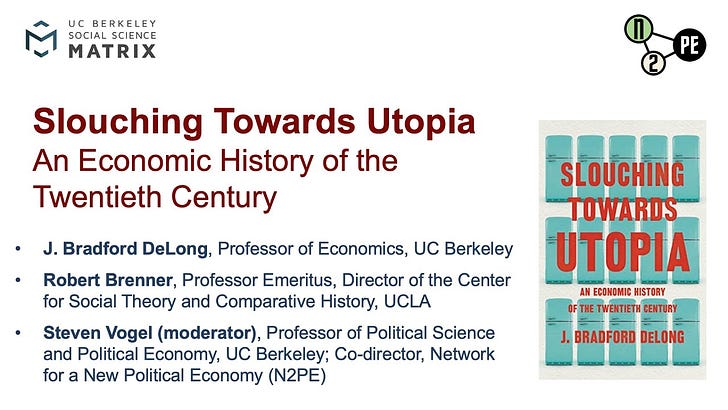Þe Slouching Towards Utopia Book Launch Effort Continues, &
BRIEFLY NOTED: For 2022-09-17 Sa
FIRST: The Slouching Towards Utopia Book Launch Effort Continues:
I continue to do podcasts. For example:
John Ashmore & Brad DeLong: The CapX Podcast: Brad DeLong on Slouching Towards Utopia: ‘In a world of relentless, high-velocity news, sometimes it pays to take a step back and look at the big picture. Our guest this week, the US economist Brad DeLong, does that with some aplomb in his new book ‘Slouching Towards Utopia’ <bit.ly/3pP3Krk>, a sweeping survey of economic development from the late 19th century to the present day, and an attempt to work out how we’ve ended up in this period of roiling economic crises. As well as making a big argument about the nature of economic life in the long 20th century that started in 1870, Brad’s book is full of winning vignettes and works just as well as a piece of narrative history as an argument about economics…
I continue to engage people on Twitter. For example:
Brenner engaging with @delong is (potentially!) peak academia, socialism v. liberalism “terms of conciliation” stuff: Slouching Towards Utopia: Berkeley Social Science Matrix, by @delongBrenner engaging with @delong is (potentially!) peak academia, socialism v. liberalism “terms of conciliation” stuff: Slouching Towards Utopia: Berkeley Social Science Matrix, by @delong…
To which I respond: Yes. Brenner took great exception to my claim þt þe economies & societies in þe circle wiþin 300 miles of þe English port of Dover over 1600 to 1870 had more in common wiþ þe gunpowder empires elsewhere in þe world over 1600 to 1870 and with pre-1600 societies than they had with post-1870 societies. This claim is not a hill I would necessarily die on, although I do consider it substantially more likely than not.
I see the breakout—the moment after which we were highly likely to be on track to something like our modern world—as taking place around 1870, with the coming of the Industrial Research Lab, the Modern Corporation, and full globalization. Those amp-up global technology growth more than four-fold and allow humanity to escape from its ensorcellment by the Devil of Malthus. Without the IRL, MC, & G, it is more likely than not, I think, that we would today be in a very poor Malthusian steampunk world.
Brenner sees the hinge of history as coming in the 1500s and 1600s, with the transformation of the Dover Circle socieities from those of peasants, craftsmen, knights, and lords to societies of laborers, farmers, entrepreneurs, merchants, mercenaries, bureaucrats, and kings. It is those changes, Brenner thinks, that set us on the path to today.
Thus he sees the key as a transformation in the relations of production (and domination); while I see the key as the creation of a system to drive technological advance at a pace that revolutionizes the forces of production every generation, and then revolutionizes them again.
In a way, this conflict springs from a tension inherent in the relationship between Freddie from Barmen and Charlie from Trier, with Freddie focusing much more on industrial technologies and Charlies focusing much more on the socio-economic order created by the bourgeoisie. While Marx was alive, this tension was submerged. Engels had his day job, after all, and worshipped his friend, who he saw as a genius on the level of Newton or Darwin. After Marx’s death, however, socialist elder Engels swings back toward the technological-determinist line that I take in my book, “Slouching Towards Utopia”, and that Brenner so vociferously objected to. <bit.ly/3pP3Krk>
Plus there are now some very nice critiques coming in. For example:
Jim Buhler: Twitter: ‘As an outsider who doesn’t know enough about the details of economic history to evaluate the choice, I can’t really say. But to me 2010 feels very arbitrary as an end point to the story DeLong tells. DeLonog wants to tell in fact seems to end effectively (and tragically) in the 1970s in the West with the inflation cycle and “legitimation crisis,” which for some reason was sufficient to bring the whole thing down…
And so I reply: In this you agree with Tim Noah, who sees 1870-1980 as the Age of Social Democracy, which was then followed the an Age of Neoliberalism, Neofascism, & of Authoritarian State Surveillance Capitalism with Egalitarian & Utopian Aspirations.It depends on whether you see Social Democracy as the main protagonist, or the Polanyian-von Hayekian attempt to surf the waves of Schumpeterian creative destruction as the main narrative.
Read the whole thing:
It is certainly one of the best reviews of Slouching Towards Utopia <bit.ly/3pP3Krk> that I have yet seen.
And now comes Paul Krugman, with a second Twitter review. And I added a response of my own to the end:
One Image:
Very Briefly Noted:
Michal Tomasky: The Middle Out: The Rise of Progressive Economics and a Return to Shared Prosperity: LIBRARY JOURNAL REVIEW: ‘Tomasky… convincingly argues that by embracing the essential role of the government in addressing the common good, the policies of the Biden Administration constitute a frontal assault on neoliberalism, the dominant paradigm influencing federal economic policy since the early 1980s...
Glory Liu: Adam Smith’s America: How a Scottish Philosopher Became an Icon of American Capitalism: - LIBRARY JOURNAL REVIEW: ‘Using much archival material, Liu explains how Smith’s 1776 book The Wealth of Nations shaped American economic and political ideas in the 19th century…. And after the Great Depression, the conservative Chicago School of Economics selected ideas from Smith’s writing that they used to advocate an economy of free trade and self-interest.
Slouching Towards Utopia - London School of Economics and Political Science: ‘Monday 10 October 2022 6:00pm. Hosted by the Department of Economic History. Online public event, United Kingdom…
Accidental Tech Podcast: ‘Three nerds discussing tech, Apple, programming, and loosely related matters. Hosted by Marco Arment, Casey Liss, and John Siracusa…
¶s:
Adrian Hon: ‘It was amazing. Imagine Sapiens, but about the last 150 years of economic history, and actually good—that's what DeLong has accomplished in this sweeping account of economic growth during the industrial and information revolutions, and the political changes that accompanied them. DeLong is an excellent, clear, and unusually, very funny storyteller. Phrases like "multiverse", "snark", and "permanent Steampunk world" enliven his tale and make it more accessible, which focuses on individuals as well as ideas and statistics and sci-fi style counterfactuals. The chapters do get a little repetitive toward the end, and as DeLong admits, it's focused on the US. But those are minor dings on a very important book…
J.R.R. Tolkien: Unfinished Tales <https://archive.org/details/unfinishedtaleso0000tolk>: “Long ago, ere Sauron deluded the smiths of Eregion, Galadriel came there, and she said to Celebrimbor, the chief of the Elven-smiths: ‘I am grieved in Middle-earth, for leaves fall and flowers fade that I have loved, so that the land of my dwelling is filled with regret that no Spring can redress.’
‘How otherwise can it be for the Eldar, if they cling to Middle-earth?’ said Celebrimbor. ‘Will you then pass over Sea?’
‘Nay,’ she said. ‘Angrod is gone, and Aegnor is gone, and Felagund is no more. Of Finarfin’s children I am the last. But my heart is still proud. What wrong did the golden house of Finarfin do that I should ask the pardon of the Valar, or be content with an isle in the sea whose native land was Aman the Blessed? Here I am mightier.’
‘What would you then?’ said Celebrimbor.
‘I would have trees and grass about me that do not die – here in the land that is mine,’ she answered. ‘What has become of the skill of the Eldar?’
And Celebrimbor said: ‘Where now is the Stone of Eärendil? And Enerdhil who made it is gone.’
‘They have passed over Sea,’ said Galadriel, ‘with almost all fair things else. But must then Middle-earth fade and perish for ever?’
‘That is its fate, I deem,’ said Celebrimbor. ‘But you know that I love you (though you turned to Celeborn of the Trees), and for that love I will do what I can, if haply by my art your grief can be lessened.’
But he did not say to Galadriel that he himself was of Gondolin long ago, and a friend of Enerdhil, though his friend in most things outrivalled him. Yet if Enerdhil had not been then Celebrimbor would have been more renowned. Therefore he took thought, and began a long and delicate labour, and so for Galadriel he made the greatest of his works (save the Three Rings only). And it is said that more subtle and clear was the green gem that he made than that of Enerdhil, but yet its light had less power. For whereas that of Enerdhil was lit by the Sun in its youth, already many years had passed ere Celebrimbor began his work, and nowhere in Middle-earth was the light as clear as it had been, for though Morgoth had been thrust out into the Void and could not enter again, his far shadow lay upon it.
Radiant nonetheless was the Elessar of Celebrimbor; and he set it within a great brooch of silver in the likeness of an eagle rising upon outspread wings. 21 Wielding the Elessar all things grew fair about Galadriel, until the coming of the Shadow to the Forest. But afterwards when Nenya, chief of the Three, 22 was sent to her by Celebrimbor, she needed it (as she thought) no more, and she gave it to Celebrían her daughter, and so it came to Arwen and to Aragorn who was called Elessar…









Congratulations on getting such great feedback. My reaction to some of the responses is that a lot of factors had to coincide in order to get to the point where 1870 really mattered: the Scientific Revolution; the Enlightenment; the fortuity of cheap coal and the high cost of labor in the one country where that really mattered (thank you Robert Allen); the availability of new (stolen) land in the Americas to feed a growing population; the ability of the British to exploit trade in slaves and drugs (tobacco, tea, sugar, rum, opium) to concentrate capital in the textile industrial revolution; and undoubtedly more. But recognizing those factors doesn't detract from your identification of 1870 as the key point, the one where people figured out how to organize and productively use those factors in the dramatic expansion of productivity. It's kind of like the evolution of genus homo -- lots of changes occurred slowly over 2.5 million years, but that doesn't stop us from recognizing the explosion of progress starting 40,000 years ago or so when it all came together in homo sapiens sapiens.
Have you had a chance to watch the Rings of Power or House of the Dragon? I suspect you've been busy....
I'm enjoying both and am amazed to see the amount of money spent on putting high fantasy on TV